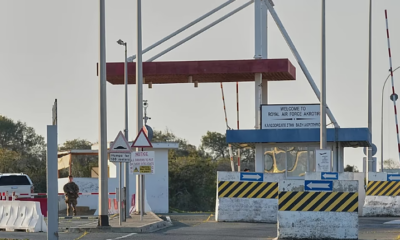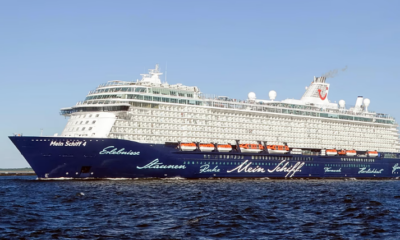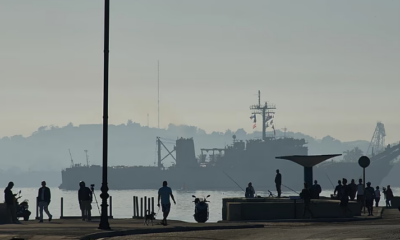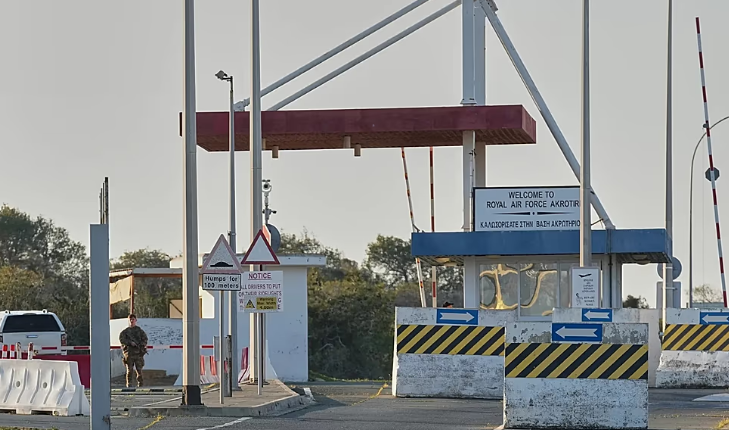News
U.S. Businesses Brace for Impact as Trump’s Tariffs Take Effect
American businesses across multiple industries are preparing for financial strain as former President Donald Trump’s newly imposed tariffs on imports from Canada, Mexico, and China take effect. The levies, which include a 25% tax on Canadian and Mexican goods and a 10% tax on Chinese imports, are set to be implemented on Tuesday, with Canadian energy products facing a lower 10% rate.
According to estimates from the Budget Lab at Yale University, these tariffs could cost the average American household between $1,000 and $1,200 in annual purchasing power. Economists also warn of broader economic consequences, with inflation projected to rise by 0.4 percentage points this year and U.S. economic growth expected to slow from 2.8% in 2023 to a decline of 1.5% in 2025 and 2.1% in 2026.
Small Businesses Face Rising Costs
For businesses like The Penny Ice Creamery in Santa Cruz, California, the tariffs could mean higher costs for essential equipment imported from China, including refrigerators, freezers, and blenders. Co-owner Zach Davis fears that rising expenses will force him to raise prices yet again. Even small items like sprinkles—imported from Ontario—will be affected by a 25% tax, potentially cutting into the shop’s already thin profit margins.
In North Carolina, Casey Hite, CEO of Aeroflow Health, a medical supply company, worries that the increased cost of Chinese-manufactured breast pumps and other supplies will ultimately lead to higher health insurance premiums for American consumers. With insurance reimbursement rates locked in before the tariffs, Aeroflow may be forced to either accept financial losses or switch to lower-quality products.
Similarly, Linda Schlesinger-Wagner, owner of Skinnytees, a Michigan-based women’s apparel brand, expects higher costs due to the 10% tax on Chinese imports. Although she plans to absorb the expense rather than pass it on to customers, she predicts that consumers will soon see price hikes across the board on everything from clothing to food and cars.
Supply Chain Disruptions and Inflation Concerns
While some industries have stocked up on goods in anticipation of the tariffs, experts warn that the economic impact will be felt within months. Construction companies, for example, have been hoarding materials, but once their inventories dwindle, the price of materials will likely spike, causing project delays and increased costs.
Supermarkets and produce vendors, however, have no ability to stockpile perishable goods. In Nogales, Arizona, tomato distributor Rod Sbragia fears that the import taxes will lead to fewer choices for consumers and higher prices on fresh fruits and vegetables.
Even American farmers could face economic consequences, as Canada, Mexico, and China may impose retaliatory tariffs on U.S. agricultural products. In Trump’s first term, China responded to tariffs by targeting American soybeans and pork, prompting the administration to spend billions in taxpayer money to compensate farmers for lost sales.
As the new tariffs take effect, many in rural America are counting on similar relief measures. “The Trump administration provided a safety net,” said Lee Wicker of the North Carolina Growers Association. “Farmers trust that he’s going to take care of anybody who’s hurt by the tariffs.”
With economic uncertainty looming, business owners and consumers alike are bracing for the financial fallout of Trump’s latest trade measures.
News
Suspected Drone Strike Hits UK Base in Cyprus Amid Escalating Iran Conflict
News
Cruise Passengers Stranded Amid Escalating Middle East Crisis
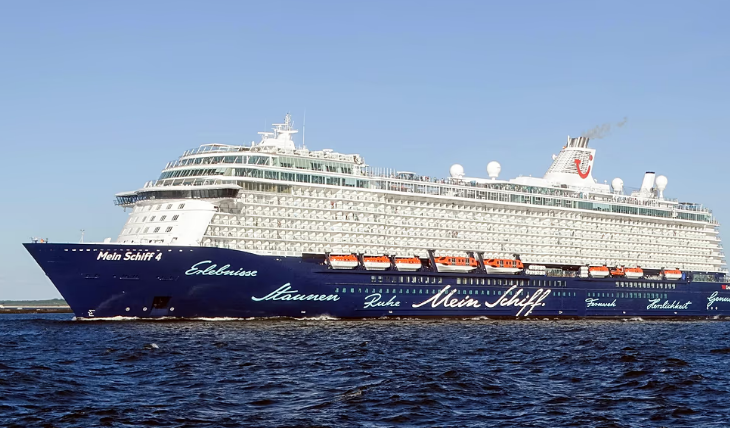
The Persian Gulf is currently characterised by hostilities. The Strait of Hormuz is closed to shipping, with only vessels connected to China or Russia allowed to pass. The escalating crisis in the region has left thousands of tourists stranded on cruise ships and disrupted air travel.
On Sunday afternoon, a missile struck the water near the Mein Schiff 4, operated by TUI Cruises, while the ship was docked in Abu Dhabi, United Arab Emirates. Clouds of black smoke were reported over the water, according to the Bild newspaper. The vessel carries approximately 2,500 passengers and 1,000 crew members, with many due to return to Germany from Dubai. The situation on board is tense, and it is not yet clear if anyone was injured.
Security measures on the ship remain strict. Passengers are prohibited from entering outside decks, are advised to avoid windows, and receive regular alerts on their smartphones about potential incoming missile threats.
A sister ship, Mein Schiff 5, berthed in Doha, Qatar, is also affected. Passengers attempting to fly home from Doha on Saturday were forced to return to the ship after flights were canceled. Many had already boarded aircraft and had to leave luggage at the airport, waiting around ten hours before being taken back to the ship in the evening.
Other cruise lines are similarly affected. Six vessels are currently docked across ports in Dubai, Abu Dhabi, and Doha. These include the MSC Euribia from MSC Cruises, the Celestyal Discovery and Celestyal Journey from Celestyal Cruises, and the Aroya from the Saudi operator Aroya Cruises.
The closure of airspace in multiple countries in the region has compounded the situation, preventing passengers from flying home. Thousands remain stranded, unsure when they will be able to continue their journeys or be evacuated safely.
The crisis follows US and Israeli strikes in the region on Saturday, which prompted retaliatory attacks by Iran targeting military positions in the Persian Gulf. Cruise passengers, many of whom expected a calm holiday, have instead faced a sudden escalation in regional tensions.
Authorities in ports and embassies are coordinating with shipping companies to maintain safety and provide updates, but the rapidly evolving security situation has made evacuation and travel plans uncertain. Tourists are advised to follow official guidance and avoid unnecessary movement on or around their vessels.
The disruption highlights the wider impact of escalating hostilities in the Gulf, affecting not only commercial shipping but also tourism and international travel. Passengers on affected cruise ships and flights face prolonged delays as authorities work to stabilize the situation and ensure safety in the region.
News
Azerbaijan Commemorates Khojaly Massacre with New Memorial and National Ceremony

Azerbaijan held nationwide commemorations on Thursday to mourn the hundreds of civilians killed in February 1992 in the town of Khojaly during the Karabakh conflict with Armenia. President Ilham Aliyev led the ceremonies, inaugurating a new Khojaly Genocide Memorial Complex in Baku to honor the victims of what he described as “the greatest tragedy for the Azerbaijani people.”
Thousands of people gathered at the Khojaly Massacre Memorial in Baku for the National Day of Remembrance. A minute of silence was observed across the country as citizens paid tribute to those who lost their lives over 30 years ago.
Azerbaijani authorities state that 613 civilians, including women and children, were killed when Armenian forces, with the support of the former Soviet Union’s 366th Guards Motor Rifle Regiment, attacked Khojaly. Dozens more were reported missing or injured during the assault, which occurred amid the war between ethnic Armenian forces backed by Armenia and Azerbaijani troops over the Karabakh region and surrounding areas.
Human Rights Watch conducted its own investigation into the incident, attributing direct responsibility for the civilian deaths to Karabakh Armenian forces. Armenia has repeatedly denied the accusations, arguing that the reported death toll was exaggerated and that casualties resulted from fighting between the two sides.
Despite differing accounts, the Khojaly tragedy remains a deeply significant event in Azerbaijan’s collective memory. Commemorations continue to emphasize the human cost of the conflict and the impact on generations of Azerbaijanis.
This year’s ceremonies took place against the backdrop of a peace and reconciliation process between Azerbaijan and Armenia. Both nations have pledged to work toward a more stable and peaceful future following decades of conflict and suffering on both sides.
President Aliyev emphasized the importance of remembering the past while looking forward. The newly inaugurated memorial complex aims to provide a permanent site for reflection, ensuring that the victims of Khojaly are remembered by future generations.
The National Day of Remembrance has become a focal point for public reflection and national unity, drawing participants from across Azerbaijan. Observers note that the ceremonies serve both to honor the victims and to reinforce awareness of the historical and ongoing challenges in the Karabakh region.
Over 30 years after the massacre, Khojaly continues to hold a central place in Azerbaijani history. Thursday’s events highlighted the nation’s efforts to commemorate the past while supporting dialogue and cooperation with Armenia to foster lasting peace in the South Caucasus.
-

 Entertainment2 years ago
Entertainment2 years agoMeta Acquires Tilda Swinton VR Doc ‘Impulse: Playing With Reality’
-

 Business2 years ago
Business2 years agoSaudi Arabia’s Model for Sustainable Aviation Practices
-

 Business2 years ago
Business2 years agoRecent Developments in Small Business Taxes
-

 Home Improvement1 year ago
Home Improvement1 year agoEffective Drain Cleaning: A Key to a Healthy Plumbing System
-

 Politics2 years ago
Politics2 years agoWho was Ebrahim Raisi and his status in Iranian Politics?
-

 Business2 years ago
Business2 years agoCarrectly: Revolutionizing Car Care in Chicago
-

 Sports2 years ago
Sports2 years agoKeely Hodgkinson Wins Britain’s First Athletics Gold at Paris Olympics in 800m
-

 Business2 years ago
Business2 years agoSaudi Arabia: Foreign Direct Investment Rises by 5.6% in Q1

